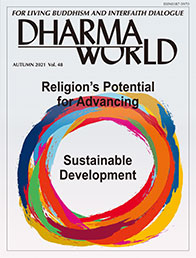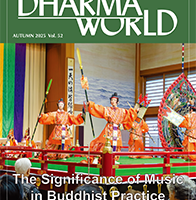 Autumn 2021, Volume 48(PDF)
Autumn 2021, Volume 48(PDF)
Religion’s Potential for Advancing Sustainable Development
In its resolution entitled the 2030 Agenda, the United Nations declared in 2015 that “The Sustainable Development Goals (SDGs) are blueprints to achieve a better and more sustainable future for all humanity by 2030.” SDGs, in contrast to the earlier Millennium Development Goals, offer a holistic understanding of development, and address most of the global problems the people of the world face, including poverty, inequality, climate change, environmental degradation, economic disparity, and peace and justice. Members of the international community are all encouraged to build a holistic platform to achieve the Agenda’s central promise “to leave no one behind.”
Given that 80 percent of the world’s population is estimated to hold religious affiliation, governments and international and local civil actors acknowledged the importance of religion and persons of faith in advancing SDGs, and have established partnership guidelines for cooperating with them. To “achieve a better and more sustainable future,” religion, whose original purpose is guiding humanity to be caring for others, is increasingly recognized by the international community as a useful human resource, rather than an obstacle.
In the face of the current global challenges presented by the COVID-19 pandemic, it is crucial for all people—both religious and non-religious—to broaden the perspectives of their strategies to achieve SDGs, as it is estimated that the pandemic could push the number of people living in extreme poverty to over one billion by 2030.
At Dharma World we will consider religion’s potential for advancing sustainable development practices. How can people of religion activate the potential of religion for the purposes of sustainable development work? How can they develop faith-based strategies to encourage sustainable development by being faithful to their own traditions while remaining open to, and tolerant of, those of others? What activities or projects are being developed by people of religion, either individually or through collaboration with other religious or non-religious people, both locally and internationally?
We would like to identify and explore aspects of religion and the practices of religious communities that can advance the global goals of sustainable development.























































































